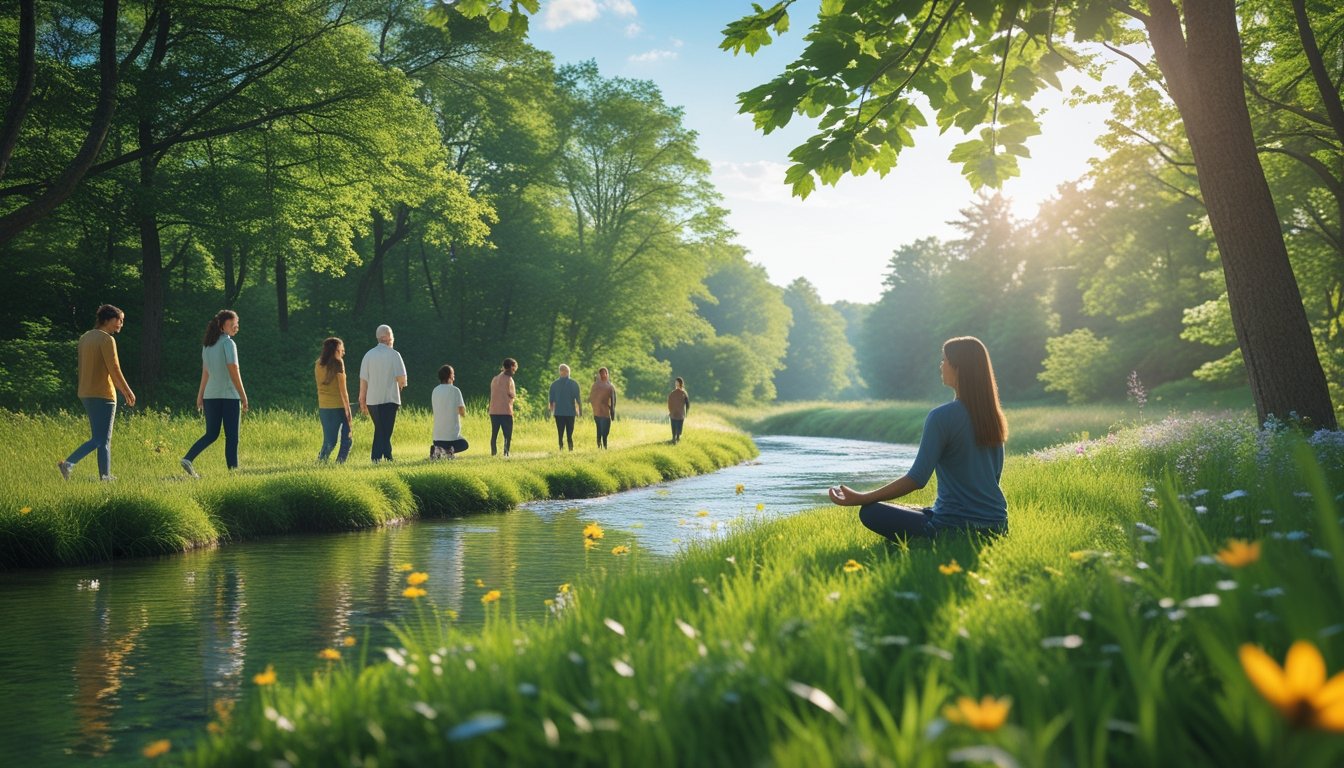Late updated: 05 Nov 2025 12:11
Written by: Ella Thompson
Exploring The Benefits Of Nature For Mental Health: Improving Wellbeing Through The Outdoors
Nature offers more than just beautiful scenery; it plays a crucial role in enhancing our mental health. Many of us have experienced a sense of calm while surrounded by greenery or the invigorating feeling after walking along a quiet beach. Scientific evidence supports the idea that interacting with natural environments can significantly improve our mood, reduce stress, and even enhance cognitive functions. This connection between nature and mental well-being is increasingly recognised as a vital component of mental health strategies.

Our world today is fast-paced, often causing stress-related issues or emotional fatigue. Ecotherapy, or nature therapy, has emerged as an innovative approach to improve mental health through regular contact with the natural world. By integrating nature into our lives, whether through a daily walk in the park or a weekend hike, we enable ourselves to tap into its powerful benefits. These experiences can rejuvenate the mind, allowing for greater focus and creativity while alleviating anxiety and depression.
We believe that understanding these benefits can inspire meaningful changes in our daily lives. When we embrace the outdoors as part of our mental health toolkit, we find a rich source of peace and rejuvenation. Through exploring the mental health benefits of nature, we aim to reveal how these natural experiences foster not only emotional peace but can also elevate our mental capacity and creative thinking.
Key Takeaways
- Nature significantly boosts mental health and well-being.
- Natural settings enhance cognitive and creative abilities.
- Regular time in nature is vital for emotional rejuvenation.
Key Benefits Of Nature For Mental Health

Nature plays a significant role in enhancing mental health. By engaging with natural surroundings, we can ease symptoms associated with depression and anxiety, reduce stress, and improve overall emotional resilience.
Reducing Symptoms Of Depression And Anxiety
Spending time outdoors can be incredibly beneficial for those experiencing depression and anxiety. Research shows that nature walks can lift mood and reduce the symptoms linked to these conditions. Natural environments encourage mindfulness and can shift attention away from negative thought patterns. Regular exposure to green spaces has also been shown to enhance serotonin levels, the brain chemical responsible for mood regulation. Natural light, abundant in outdoor settings, can also help with mood regulation and the body’s circadian rhythms.
Alleviating Stress And Mental Fatigue
Nature provides an excellent escape from daily stressors. When we immerse ourselves in green spaces, cortisol levels, the hormone associated with stress, often decrease. This respite allows for the restoration of attention and mental clarity. Engaging in activities such as hiking or gardening not only provides physical exercise but also serves as a meditative practice. The sounds of nature, like chirping birds or running water, can have a calming effect, promoting relaxation and easing mental fatigue.
Improving Well-Being And Emotional Resilience
Spending time in nature boosts emotional health and builds resilience. Connecting with the environment can enhance overall well-being by encouraging a sense of connection and belonging. Nature provides opportunities for social interaction in a relaxed setting, whether through community activities or simply taking a walk. These connections foster supportive relationships, which are vital for emotional growth and resilience. Embracing nature also encourages creativity and problem-solving, further strengthening our capacity to handle life’s challenges.
Supporting Recovery From PTSD And ADHD
Nature-based therapies have shown promising effects for individuals with PTSD and ADHD. Engaging in structured outdoor activities can aid in the recovery process by providing a safe environment to explore and express emotions. For those with ADHD, nature helps improve concentration and reduces hyperactivity. The tranquillity of nature can ease PTSD symptoms by reducing agitation and promoting a sense of safety. Activities like equine therapy or nature walks create a soothing impact, fostering recovery and improving focus.
How Natural Environments Foster Cognitive And Creative Growth
Natural environments are known for their positive effects on cognitive development and creative abilities. Interaction with green spaces can enhance cognitive function and promote creativity. Engaging in activities like forest bathing and gardening offers practical ways to integrate these benefits into our routines.
Enhancing Cognitive Function And Working Memory
Connecting with nature plays a significant role in improving cognitive capabilities. Studies have highlighted that being in natural environments can lead to improvements in working memory and overall cognitive processes. Our brains seem to respond positively to the peacefulness and diversity found in natural settings.
The cognitive benefits are partly attributed to reduced stress, as green spaces provide calming stimuli. This reduction in stress leads to clearer thinking and better memory retention. Activities such as hiking or simply sitting in a park allow our brains to reset, further enhancing our cognitive abilities.
Boosting Attentional Capacity And Soft Fascination
Nature's unique ability to engage us gently, known as soft fascination, is crucial in restoring attentional capacity. Unlike urban settings, which require constant attention and control, nature offers a form of leisure that gently holds our interest. This gentle engagement allows our minds to rest and recover from directed attention fatigue.
Soft fascination helps in maintaining focus and increasing productivity. Spending time in gardens or by water bodies, for instance, distracts us with their simple beauty, allowing for mental rejuvenation. Our attentional systems benefit greatly from these subtle and non-intrusive types of engagement offered by the natural world.
Cultivating Mindfulness And Creativity
Interacting with natural environments nurtures mindfulness and sparks creativity. By being present in serene surroundings, we cultivate a mindful state, promoting self-awareness and reducing anxiety. This mindfulness encourages us to reconnect with our thoughts and reflect deeply, enhancing creative problem-solving and idea generation.
Creative thinking is often stimulated in diverse, changing settings like forests or beaches. These environments facilitate a sense of freedom and open-mindedness, encouraging us to think outside conventional boundaries. Inspiration drawn from nature often leads to unique and artistic expressions in art and innovation.
Practical Ways To Incorporate Green Spaces Into Daily Life
Incorporating green spaces into our daily lives need not be a complex task. Activities like gardening can be seamlessly introduced into our routines, providing a therapeutic break and a chance to connect with nature. Similarly, forest bathing—a simple, meditative walk through a wooded area—offers numerous cognitive benefits.
We could consider work breaks in nearby parks or creating a small garden at home. Integrating these activities not only enhances mental health but also fosters a greater connection with nature. These practices offer a practical approach to reap the cognitive and creative benefits of our natural surroundings amidst urban living.
Frequently Asked Questions

In this section, we address common questions about the mental health benefits related to exposure to nature. From reducing stress to enhancing cognitive functions, nature's impact on our mental well-being is both profound and measurable.
How does exposure to green spaces contribute to stress reduction?
Green spaces have a calming effect on our minds. Studies reveal that nature can decrease cortisol levels, a hormone associated with stress. Regular time in parks or gardens helps lower stress, promoting relaxation and peace.
What role does nature play in improving mood and emotional well-being?
Being in nature boosts mood and emotional health by increasing levels of serotonin and dopamine, chemicals linked to happiness. The beauty and tranquillity of natural settings serve as a natural mood enhancer, offering respite from daily pressures.
Can regular walks in natural environments have a positive effect on anxiety levels?
Walking in nature can significantly reduce anxiety. The act of walking combined with fresh air and scenic views helps clear the mind, diminishing anxious thoughts. Regular strolls through natural environments foster a sense of calm and clarity.
To what extent do outdoor activities bolster mental resilience?
Outdoor activities build mental resilience by fostering a sense of accomplishment and adaptability. Activities like hiking or group exercises in nature challenge us physically and mentally, enhancing our ability to cope with stress and adversity.
What are the cognitive benefits linked to spending time in natural settings?
Spending time in nature can improve cognitive functions such as memory and attention. Exposure to natural environments has been shown to restore depleted cognitive resources, enhancing mental clarity and focus.
How might contact with nature influence depression symptoms?
Nature can have a positive effect on depression symptoms. Connection with the natural world may reduce feelings of sadness and enhance a sense of well-being. Engaging with nature is a simple yet impactful strategy for improving mental health.
